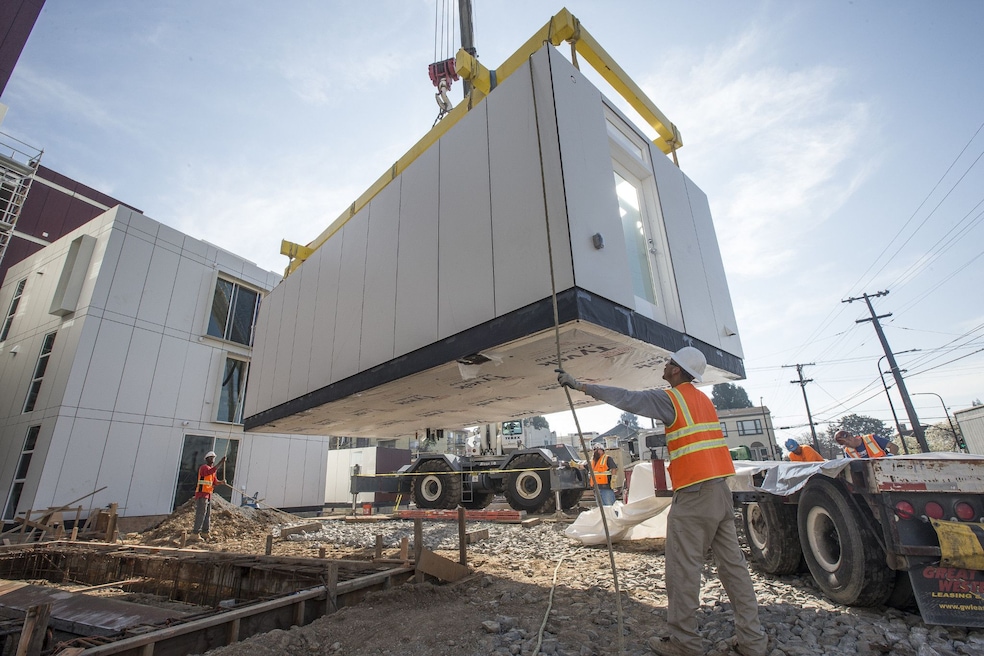Factory-built homes are touted to be significantly cheaper than traditionally built ones, though that hasn’t quite yet been the case in Colorado. A new state law, signed last week, aims to remedy this and deliver cheaper, faster homes to Coloradans, lawmakers say.
Modular builders — companies that build homes in a factory and then install them on-site atop a foundation — in the state have yet to maximize on factory-built housing’s economies of scale, said state Rep. Rebekah Stewart, a prime sponsor of the bill. This is due to local building codes, which vary by municipality, making it difficult for modular builders to produce at high volumes.
“The issue in Colorado is that zoning is controlled on a municipality-by-municipality basis. Every single time a developer wanted to take advantage of factory-built, they still had to comply with one of well over 300 different regulatory environments,” said Stewart in an interview. “That really limited their ability to fully take advantage of the cost savings.”
SB25-002, known as the Regional Building Codes for Factory-Built Structures bill, creates a new statewide code for factory-built housing. It also applies to tiny homes, which are regulated differently in the state and do not have a fixed foundation.
Colorado officials are betting faster permitting will translate into cheaper modular homes for builders who will then pass savings on to consumers. The current process limits cost savings on Colorado homes to 9%, whereas factory-built housing should reach up to 25% savings under the new law compared to traditional stick-built homes, said Stewart.
According to home services marketplace Angi, the average cost of a modular home in the United States is $270,000, while the S&P CoreLogic Case-Shiller reports the median cost of a traditional home is $324,900.
New statewide building code
The Colorado law requires a statewide code to be developed by July 1, 2026, under the guidance of a 20-person advisory board. The board will consist of licensed tradespeople, local building departments, a fire prevention expert, modular builders, representatives of the modular building industry and a climate resilience expert.
The code will ultimately be the highest standard so it can apply to the weather and fire suppression needs of various climate zones throughout the state, said Stewart, who described it as “the highest common denominator for every climate zone.”
“And those will be the standards that the manufacturers will adhere to in the factories before bringing them onsite. Once everything gets on site, then the municipality takes over,” she said. “Anything prior will be done to the state code standards.”
Electric, framing and other systems installed within the factory will be inspected according to the state code. The foundation and any work done on site adheres to the local building code. Because these codes require modular homes to be built to the highest standard, there were concerns that prices would also increase.
“The manufacturers still said if everyone is following the same standards, that allows us to build to this economy of scale and we’re still going to be able to realize the significant cost savings even at the higher building code standard because they’re not going to be changing how they build,” she said. “These will be some of the safest and highest standards in the entire area.”
The state has a shortfall of 100,000 housing units, according to a 2023 report from the housing affordability research organization Up for Growth. It’s worked to pass several laws to ease the housing shortage and make construction easier and homeownership more affordable.
Last year, Colorado passed a law called Housing in Transit-Oriented Communities that requires more housing around transit corridors and abolished a parking minimum for areas so that the land can be used to create more housing. Starting next month, the state will also begin permitting accessory dwelling units in many jurisdictions.
The factory-built housing bill applies to this, allowing for streamlined construction of ADUs, in addition to tiny homes, multifamily buildings and single-family homes.

